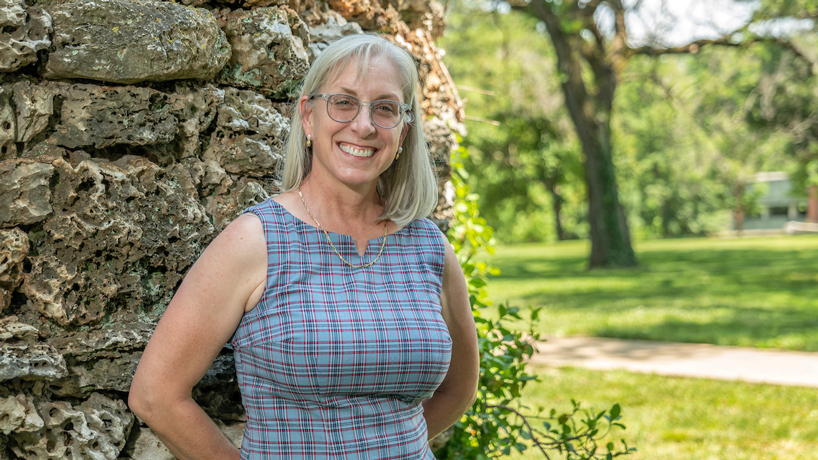
Theresa Coble, the E. Desmond Lee Endowed Professor of Experiential and Family Education, was one of 15 new members named to the National Park System Advisory Board. (Photo by Derik Holtmann)
For more than two decades, Theresa Coble has worked closely with the National Park Service to advance the field of interpretation – an educational discipline that helps people find meaning and facilitate connections at informal learning sites such as national parks.
Coble, the E. Desmond Lee Endowed Professor of Experiential and Family Education at the University of Missouri–St. Louis, has regularly garnered recognition for her contributions to the field, including the National Association for Interpretation’s 2019 Fellow Award. However, Coble described her most recent nomination as “an honor of a lifetime.”
Secretary of the Interior Deb Haaland appointed Coble and 14 other new members to the National Park System Advisory Board last month.
“National parks are some of the most visible and important forums for visitors to explore the outdoors and learn the complicated yet vital story of America.” Haaland said in a DOI press release. “These new National Park System Advisory Board members represent experienced practitioners in cultural and natural resources management, as well as experts in relevant academic fields including environmental law, geography and history. I look forward to their insight as we work to make our public lands accessible and inviting to all.”
The board advises Haaland and Charles F. Sams, director of the NPS, on matters relating to the service’s work. In addition to its advisory role, the board also has a regulatory role in recommending new national natural landmarks and national historic landmarks and provides recommendations regarding the national historic significance of proposed national historic trails.
Coble is excited about the new role and echoed Haaland’s sentiments about the important role national parks play in the national consciousness.
“The National Park System represents America’s highest aspirations,” Coble said. “It helps us reckon with our most ignoble and even dehumanizing policies, practices and actions. It preserves our most stunning natural grandeur, while also managing millions of acres of federal lands so that we can maintain ecological health in perpetuity. NPS sites call us to reflect, to learn and grow, to reconnect with who we are and who we want to be, and to rededicate ourselves to make sure that our day-to-day actions and interactions align with that high calling.”
College of Education Dean Ann Taylor lauded the appointment.
“The College of Education is honored to be the academic home for E. Desmond Lee Endowed Professor of Experiential and Family Education Dr. Theresa Coble,” Taylor said. “We could not be more proud to stand beside Dr. Coble as she is recognized and appointed to this high position. As one of our remarkable endowed professors, Dr. Coble has designed and shaped a Heritage Leadership doctoral program to provide outstanding opportunities for professionals to stretch, grow and create their futures as scholars of practice. For more than seven years, employees from national parks and other educational settings have studied together to envision and imagine the best for their fields. We have been privileged to welcome National Park Service leaders as mentors and instructors into this nationally renowned program. To see Dr. Coble appointed to the National Park Advisory Board now is one more marker of the quality and national import of this work.”
Coble, who earned a PhD in forest resources from the University of Minnesota, has partnered with the NPS since the mid-1990s to conduct research and interpretive project work at more than 25 national parks including Arches National Park, Mesa Verde National Park and Yellowstone National Park. In 2003, Coble partnered with the NPS to launch an online master’s program in resource interpretation at Stephen F. Austin State University, where she was a faculty member from 2003 to 2015. The program was successful in attracting students across the country, particularly those from rural and isolated regions.
After coming to UMSL in 2015, Coble founded the online Heritage Leadership for Sustainability, Social Justice and Participatory Culture EdD cohort. The program incorporates NPS curricular documents such as “The Foundations of 21st Century Interpretation” and has enrolled eight NPS park rangers and U.S. Fish & Wildlife Service agents. Additionally, 12 of Coble’s EdD students have conducted or plan to conduct doctoral research at NPS sites, including Glacier Bay National Park and Preserve, Joshua Tree National Park, Little Rock Central High School National Historic Site and Navajo National Monument. Last spring, she also tapped former NPS Director Robert Stanton – the first Black director in the bureau’s history and the first director to be confirmed by the U.S. Senate – to serve as the College of Education’s latest scholar in residence.
In addition to her work with the NPS, Coble previously served terms as a member of the board and treasurer for the National Association for Interpretation and sits on the board of directors of the Jefferson National Parks Association as secretary.
Coble’s term on the National Park System Advisory Board is not to exceed four years. The board will meet for the first time later this year. Sams noted that the expertise of Coble and her fellow board members will be vital in the coming years.
“The challenges faced by the National Park Service reflect the challenges faced by our nation,” Sams said in a press release. “Whether it’s an increasing demand for dwindling resources, the impacts of a changing climate or the struggle to understand how our past influences today’s injustices, recommendations developed by the National Park System Advisory Board will help us strengthen our connection to the land and to our history.”














